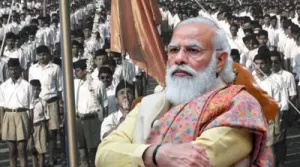When Sri Chandrasekhara Bharati headed the Sringeri Sharada Peetam as its 34h Acharya, the normally calm and serene pontiff expressed disgust when a group of Hindus outlined a plan to teach Muslims a lesson. This incident is worth recalling in the immediate context of today’s Karnataka politics.
This happened when the Acharya, a man of vast learning, humility and renunciation, was visiting Tiptur town in Tumkur district in Karnataka. It was an area simmering with Hindu-Muslim tensions.
The sage was travelling in a palanquin. With him was a large procession. The authorities were tense because the crowd was to pass by a mosque playing devotional music. This could trigger trouble.
But as the Hindus came close to the mosque, a pleasant surprise awaited them. A large number of Muslims gathered there bowed their heads in respect to the Hindu religious head.
As the marchers halted, an elderly Muslim read out a poem in Urdu welcoming the Acharya, who headed the Sringeri Peetam from 1912 to 1954, a tumultuous period in India’s history. Another Muslim man read a welcome citation. The Muslim gathering then offered fruits and flowers to Sri Chandrasekhara Bharati.
Naturally, there was jubilation all around. The widely respected Acharya blessed the Muslims. The procession moved on.
Unfortunately, a Muslim boy played mischief. He spread the word that Muslims had made the Acharya stand silently before the mosque on the pretext of welcoming him.
Some Hindus became angry on hearing this. They decided to teach the Muslims a lesson by taking out another procession, which would pass by the mosque playing musical instruments.
When this was proposed to the Acharya, he pulled up the devotees in no uncertain terms. According to one of his biographies (A Legacy of Blessings: Sri Sri Chandrashekhara Bharathi), he spoke the bitter truth while emphasizing the core values of Hindu religion.
“Giving heed to the idle gossip of some youth, have you concluded that the Hindu community was insulted? In retaliation to the gossip of an irresponsible youth, it is wrong to hurt the sentiments of the respectable members of that community. Your thinking is not based on morality or dignity. The respect you achieve by playing musical instruments before a mosque or the disrespect felt by the members of the Muslim community are negligible. You using us as a pawn to settle scores and satisfy your bloated egos has left us disgusted. We will not be a party to such things.”
The next morning, the Acharya quit Tiptur abruptly with his attendants. He refused to reverse his decision despite pleadings from the devotees. “Enmity, hatred, jealousy and retaliation do not foster religious sentiments and spiritual growth. Your display of devotion is more out of your ego than out of respect. We will not stay here any more.”
Some devotees rushed to Honavalli, the Acharya’s next halt, and begged for forgiveness.
The Acharya’s talks on Hindu religion attracted members of all religious communities although Hindus were the overwhelming majority. In 1939 or 1940, a police officer, Abdul Kareem, told the religious leader that his faith in God prevented him from doing any wrong. A pleased Acharya replied: “That is the aim of all religions.”
When a Westerner told the Acharya that he wanted to embrace Hinduism, the Acharya surprised him by asking why. “What is the shortcoming in Christianity?”
When the surprised visitor, as stated in the same book, said Christianity had not given him peace of mind, the sage replied: “This is unfortunate. Have you sincerely taken up spiritual practices as prescribed by your religion? Be honest. Have you understood the teaching of Jesus Christ and attempted to lead life accordingly? … I suggest that you put in the best efforts first to be a true Christian. Take up spiritual practices as ordained by Christ.”
The Acharya then gave a spiritually logical reasoning against religious conversions. “It is not by accident that you have been born a Christian. Taking into account the karma accumulated in your previous births, to make your present birth fruitful, the Lord has decided that Christianity suits you best and has ordained that you be born a Christian. Thus, your liberation is in following Christianity and not in following other religions. It is not necessary to change your religion. What needs to be changed is your way of life and your spiritual efforts.”
Another Westerner who was given a similar explanation after he too expressed a desire to become a Hindu informed the Acharya: “Your religion inspires a Christian to be a true Christian, a Muslim to be a true Muslim, and a Buddhist to be a true Buddhist. I realized today the unique outlook and greatness of Hindu religion.”
Sri Chandrashekhara Bharati was known to have mastered yoga. He was said to possess many supernatural powers or siddhi with which he helped devotees. Like sincere Hindu holy men before him and later, he never made a public spectacle of his powers. Nor did he clamour for fame.
Whenever he helped ailing devotees to recover, he — like the revered Chandrashekarendra Saraswati of the Shankara Matam at Kancheepuram in Tamil Nadu — attributed every positive happening to God. These sages were very learned. They knew that some Muslim invaders had attacked Hindu temples and Christian missionaries had converted poor Hindus. But their ingrained spirituality did not allow them to abuse an entire community just because of the follies of some.
Millions around the country, including in Karnataka, even today regard Sri Chandrasekhara Bharati as an embodiment of God. He is worshipped particularly by those who owe allegiance to the Sringeri Peetam, the first of the four mutts set up in the country by Adi Shankaracharya.
The late Acharya’s conduct vis-à-vis his own devotees in the context of communal issues as well as his unambiguous views on religious conversions, hatred and spiritual evolution are of immense significance. Did Narendra Modi and his colleagues in BJP know they were brazenly defying Sri Chandrasekhara Bharati when they try dividing voters on religious lines? Would the learned Hindu sages ever condone hatred against minorities? Is the BJP really following Hindu principles?
(M.R. Narayan Swamy is a noted journalist and is Executive Editor with IANS, New Delhi, and a long-time Sri Lanka watcher. He is the author of two books on Tamil militancy. Article courtesy: Mainstream Weekly.)




